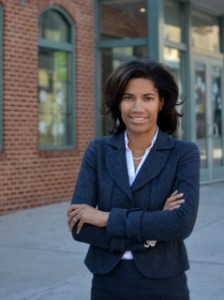
Shannon Sneed is running for City Council in Baltimore’s 13th District, wanting to expand job opportunities for residents and resources for youth. (Courtesy photo)
Shannon Sneed is running for City Council on a platform of bringing middle-class job opportunities and more resources to the youth of East Baltimore’s 13th district.
Sneed first came to Maryland to study at the University of Maryland Eastern Shore, going on to complete a master’s degree at Morgan State University, and pursuing a career first in journalism, and later in city government at the Mayor’s Office of Employment Development.
Sneed first became involved in local politics after buying her home on E. Fayette St. and finding city government unresponsive when it came to handling even relatively minor complaints, like cars being ticketed and towed because of an outdated sign that should have been removed. Sneed ran for City Council in 2011, falling short of her goal by only 13 votes, and is running again because, in her words, “no one’s representing the people in need, the folks in my community who live below the poverty line.”
Sneed also says that the 13th district has been without engaged council representation for some time, compelling her to enter the race against incumbent Warren Branch.
“I’m right on the line, and across the street is , and I saw [1st district councilman] Kraft being active. He would come to meetings, if you sent an email he would respond back, and so that’s the type of representation that I want, and when I hear my neighbors, that’s the same they want as well,” said Sneed.
To better represent her neighbors and the residents of the 13th, Sneed wants to bring her experience at the Office of Employment Development to bear in order to help create pipelines to middle-class jobs by forming partnerships with institutions like Johns Hopkins University, which is located in the 13th district and is regularly engaged in construction projects.
“We have a lot of construction over here , but some of the men, who would be able to take care of their families, if they would have an opportunity to have a shot at some of those construction jobs over here, that would make a difference. Right now that’s not happening, so I would just like to see a better partnership with the community. . . . We want local people to work on jobs (located) here in Baltimore City,” said Sneed, who also wants to see training programs developed to serve as pipelines for available middle-class jobs at Johns Hopkins Hospital as well.
Baltimore needs its own residents working the jobs available inside the city, says Sneed.
“That’s what’s going to make Baltimore City thrive, and ultimately it will make Maryland a better state if you have people that are working in Baltimore City, and they’re spending their money in Baltimore City, and then their resources are going back into the city,” said Sneed.
Resources and job opportunities for youth also need to be expanded, a message made exceptionally clear on April 27 when looting broke out in various parts of the city, says Sneed. While she supports Mayor Stephanie Rawlings-Blake’s plan to sell a number of city-owned parking garages to fund recreation center construction, Sneed feels more must be done.
“I don’t see anything wrong with if we are actually going to help our youth, but it will take more than just that. I feel like if it was that cut and dry, it would’ve happened,” said Sneed about funding new recreation center construction.
The key will be thinking outside the box about how we fund such construction, said Sneed, but she did not elaborate on exactly what kind of out of the box alternatives the city ought to pursue for such funding.
On the youth jobs front, Sneed says she wants to see more partnerships with businesses that ensure more youth have job opportunities within reach.
“To me, is a partnership with businesses, and it’s really asking people to step up. It’s with our colleges, it’s every party in Baltimore City. If you do business in Baltimore City you should be able to hire one youth,” said Sneed, referring to the city’s youth hiring program, Hire One Youth.
Of course, funding such opportunities is often a challenge, as the city saw recently when it received roughly twice the number of applicants than it could fund available jobs for through the Hire One Youth program. For Sneed, the funding question is less a matter of resources, however, and more a matter of will.
“We raise money for everything else, why can’t we raise money for our students? Why can’t we write grants and everything else? For the businesses that have it, why aren’t we asking them to donate? That’s how we get it done, it’s everyone ,” said Sneed.


